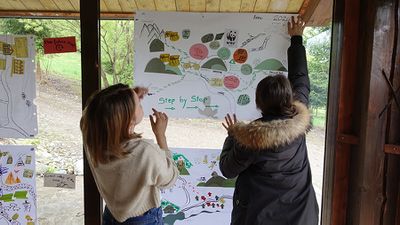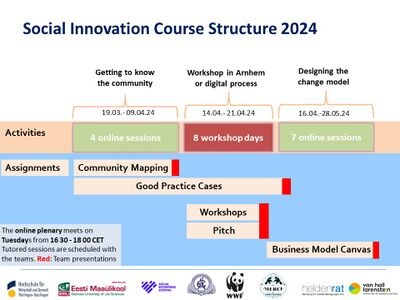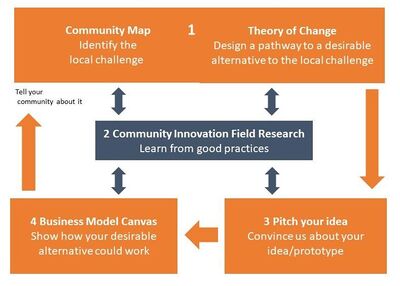Seminar Social Innovation and Entrepreneurship Spring 2024
An international online seminar offered by a European partnership of universities and NGOs in cooperation with local communities
- Online Course with ERASMUS workshop in Arnhem, Netherlands from April 14.-21, 2024.
- PPT Presentation Online Seminar and Community Labs 2024
- Our new course has started on March 19, 2024, at 16 30 CET
>>>application for this year has closed
Get some impressions from our living labs
Who is this course for?
- Are you a business or economics student who cares about social and environmental problems?
- Are you an agronomy student who wants to make agriculture more beneficial for society and the environment?
- Are you a planner, designer or artist who wants to learn how to start a business that helps solve social problems in your everyday environment?
- Or are you already a professional?
- Are you curious about other people and their knowledge and want to learn from other Europeans?
- Do you believe in your capability to create something new?
- In short, would you like to become a social entrepreneur? Then join us this semester, because everyone can become an entrepreneur!
Course presentation
>>> Download Arnhem Workshop Outline
What is this course about?
Provided ID could not be validated. Our programme is addressed to anyone who wishes to work in and with local communities to initiate innovation for sustainabilty. This can include social entrepreneurship. A social entrepreneur applies business tools for solving social and/or environmental problems. Success in social entrepreneurship is primarily measured by degree of social impact, not only monetary profit.
The scope of community innovations is however much larger. It also includes organisational change or new cooperation models. In some cases it can mean initiating any type of business in order to sustain local economy, for example in rural contexts.
Social innovation is essential for solving Europe’s economic, social, and environmental challenges. We need growth that is fairer, greener and anchored in local communities. A model that values social cohesion as a genuine source of collective wealth. It is urgent that students and practitioners from different disciplines learn from each other to develop entrepreneurial skills and social awareness for a sustainable, local impact.
Community Learning for Local Change is a programme offered by a 4-University Consortium in cooperation with relevant NGOs. The goal is to empower future changemakers through an interdisciplinary, problem-based learning environment that enhances the innovative competencies needed for addressing social, cultural and environmental challenges. The programme has been funded by the ERASMUS+ Programme in the period 2018-2021.
Our online course includes 12 live online lectures and various tutored session on the internet, as well as interdisciplinary and international group work with students from Romania, Estonia, the Netherlands, and other European countries. The online course is open to anybody interested in the subject.
Course Content
This is a so-called blended learning course, this means that a part of this course is done online and another part on site.
The online module consists of twelve 90-minute sessions of lectures, reading materials, collaborative group work and other diverse active and passive learning tools. This is complemented by a number of highly interactive tutored sessions.
The thematic elements of the course are designed to give students core knowledge for community-based innovation:
- Local communities: Identifying challenges and goals
- Designing pathways to the goals
- Designing the change model
Course Schedule
- Online lectures will take place from 19.03. – 28.05.2024, with weekly sessions.
- Online lectures are held on Tuesdays from 16 30 – 18 00 pm CET.
- In addition, one weekly tutored session is scheduled individually.
Assignments
- Active participants will complete four assignments both individually and in groups.
- The assignments are as follows:
- Community mapping and theory of change (team)
- A case study report (individual)
- Ideas pitch (team)
- A Business Model Canvas (team)
- More details can be found on the assignments pages.
Conditions for participation and credits
Participation in this course is open to all study programs and free of charge.
Academic recognition for successful completion will be as follows with a maximum of 8 ECTS:
- up to 5 ECTS for the online seminar (active participation)
- additional ECTS might be awarded at your local institution depending on the degree of involvement in the local community work or other curricular contexts.
- Students need to seek individually for academic recognition at their respective universities
- there is usually at least one recognition opportunity at each university of this ERASMUS partnership
Participant numbers
There is no set limit regarding the number of participants in the online course. Any interested student, graduate or young professional is invited to attend. All participants who successfully complete the assignment will be issued a certificate on behalf of the five academic institutions involved. Passive, listen-only participation in the online course is also possible, but no certificate will be issued for this participation mode.
Active participation includes:
- registration before 15th of March 2024
- regular attendance of the online class (or working with the seminar recordings in due time)
- participation in the community innovation labs
- completion of the seminar coursework and group assignments
- academic recognition of up to 5 ECTS (+ 1 ECTS for personal reflection)
Passive participation includes:
- registration can be done any time, but preferably before the first session. Send an email to info(at)localchange.eu
- visitation of online seminar sessions either in real time or through video recordings;
- no academic recognition granted
Key dates
Online course
- Online lectures will take place from March 18 to May 28, 2024, with weekly sessions on Tuesdays from 16 30 – 18 00 pm CET and an additional tutored session
- Parallel group work in international teams and our community labs
- ERASMUS Workshop in Arnhem from April 14-21, 2024
Further information
ERASMUS+ Programme and the German National Agency




